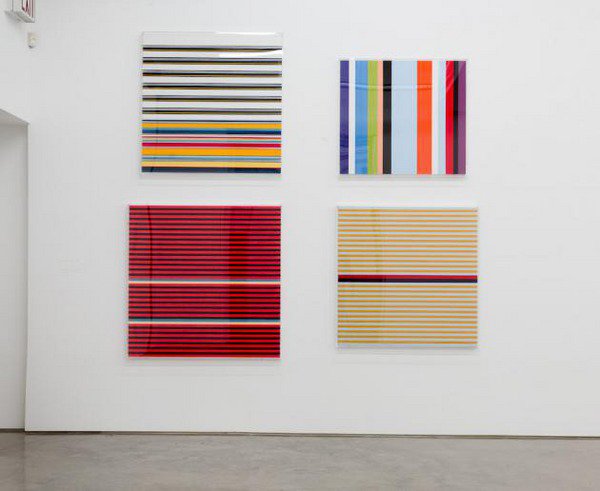Rosemarie Trockel
dal 7/11/2013 al 20/12/2013
Segnalato da
7/11/2013
Rosemarie Trockel
Barbara Gladstone Gallery, New York
The exhibition features a series of new wool paintings and wall sculptures, both of which demonstrate an ongoing interest in juxtaposition and allusion, themes that pervade much of Trockel's work. With a nod to the formal compositions of 20th century abstract painting.

Gladstone Gallery is pleased to present an exhibition of new work by Rosemarie Trockel. For over thirty years, Trockel has disputed the fixed nature of representation through her work, exploring meaning as an ever-shifting construction through the myriad forms that comprise her practice. Though Trockel has consistently resisted an explicit stylistic signature, certain recurring themes weave throughout her oeuvre, most notably notions of female identity and feminism, the disjunction between fine art and craftsmanship, and the varying presence or anonymity of the artist traceable in a physical object. Displacing materials from their original context and using them as both medium and art form, Trockel brings forth aspects of the unknown, the humorous, the surprising, and the bewildering in her knit works, ceramics, sculptures, drawings, videos, and collages.
The exhibition features a series of new wool paintings and wall sculptures, both of which demonstrate an ongoing interest in juxtaposition and allusion, themes that pervade much of Trockel’s work. With a nod to the formal compositions of twentieth century abstract painting, the wool works convey a non-figurative painterly surface, but, upon closer inspection, the “brushstrokes” reveal themselves to be carefully placed pieces of yarn. Wool has been considered Trockel’s signature material since she first utilized the medium to create a series of machine-knit wool works in the 1980s. These new wool paintings, which feature bold horizontal and vertical stripes of color as well as monochromatic compositions, are installed salon-style, encouraging new readings of form and abstraction, and bringing texture and three-dimensionality to the picture plane.
A new series of wall sculptures made of acrystal, Perspex, and acrylic paint are also on view. Applying casts of different cuts of meat to transparent, curved, carrier panels, Trockel wryly acknowledges the gravitation towards the use of unconventional materials in twenty-first century art practice. Creating works in which the surprising and non-traditional process of making is utterly concealed, Trockel inverts our traditional conception of an art form, mixing craft and production to elicit new modes of viewing.
The exhibition also includes Copy Me, a large-scale cast steel and plastic sculpture in the shape of two adjoined sofas, one an exact replica of the other. Creating a distressed surface to suggest years of wear and tear, Trockel encourages the viewer to see this sculpture as the banal domestic object it imitates, and then playfully invites the viewer to mimic it. This tradition of copying is fundamental to Trockel’s work, a process that she engages in repeatedly in an effort to challenge predetermined conceptions of representation. Undermining art historical connotations with micro-interventions, subtle manipulations, and sometimes nearly invisible gestures, Trockel subverts our preconceived notions of objecthood, trading in paint for yarn, replacing the traditional human subject with an animal one, and turning everyday objects into artworks.
Rosemarie Trockel was born in Schwerte, West Germany in 1952 and now lives and works in Cologne. Her work is currently on view in “Il Palazzo Enciclopedico” at the 55th Venice Biennale. Most recently, Trockel was the subject of two major solo exhibitions, “A Cosmos,” which originated at Museo Nacional Centro de Arte Reina Sofía, Madrid and traveled to the New Museum, New York and Serpentine Gallery, London; and “Flagrant Delight,” which was presented at Wiels, Brussels, Culturegest, Lisbon, and Museion, Bolzano, Italy. Trockel has had solo exhibitions at numerous notable institutions including: Kunstmuseum Basel, Switzerland; Museu Paco das Artes São Paulo, Brazil; Museum Ludwig, Cologne, Germany; The Drawing Center, New York; and Centre Georges Pompidou, Paris. Trockel represented Germany at the Venice Biennale in 1999 and participated in Documenta in 1997 and 2012.
For further information please contact contact Abby Margulies +1 212 206 9300 or amargulies@gladstonegallery.com
Opening November 8, 6 – 8 pm
Gladstone Gallery
515 West 24 Street New York, NY 10011
hours: Monday – Friday, 10am – 6pm
Free Admission



